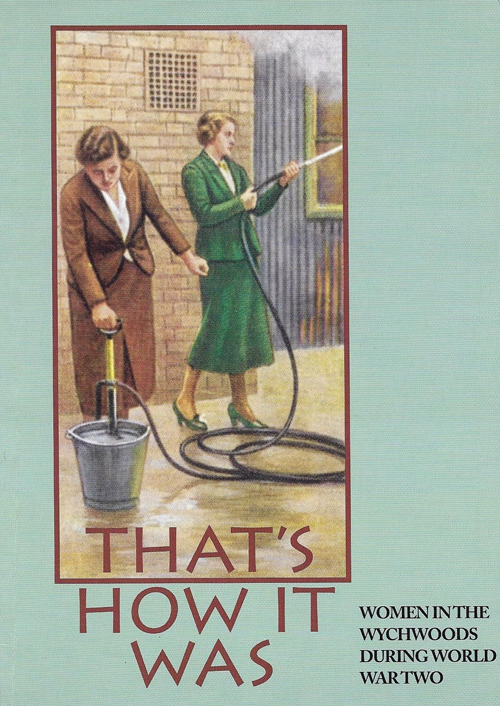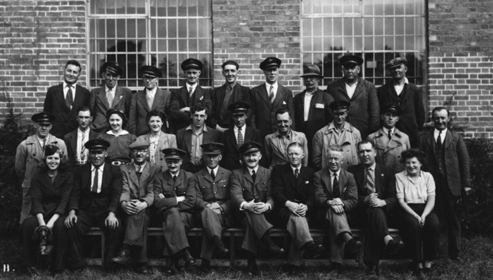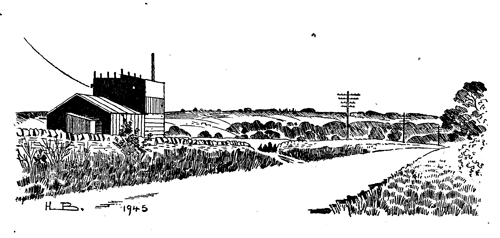“That’s How it Was” | Introduction | Wychwood Women : The Interviewees | Declaration of War | The Arrival of Evacuees| School Time | Preparing for War at Home | Soldiers and Airmen | For the Common Cause | Dr Scott and the Canteen | Domestic Life | We Were Lucky Out Here: Food Rationing | Work for Women Outside the Home | The Effects of War

… from the Wychwoods “That’s How It Was” Publication
It was not only children who were billeted on the villagers of the Wychwoods; the military billeted officers and NCOs in private homes and requisitioned any empty buildings. The 50th Northumbrian Division arrived in October 1939. They took over the Beaconsfield Hall, St Michael’s Home, part of Shipton Court and the Prebendal, the clubrooms of the public houses as well as barns, stables and their lofts. During their stay here that first winter, many were invited into local homes for tea or Sunday lunch, or merely to sit by the fire and chat; a practice that continued with later military arrivals.
Peter Davis remembered that they had three or four offices at the Old Malt House in Shipton, which fortunately had two staircases. ‘It was divided off to a certain extent, the soldiers had the bottom end and we had Kethero’s end. They had the front door and we had the back door.’

The 50th Division left to join the British Expeditionary Force in France in January 1940 and was later evacuated through Dunkirk at the end of May, although not returning to the area. The WVS were on hand at local stations where troop trains had priority on local lines but hospital trains had top priority. Dorothy Harrison remarked, ‘At last people realized how serious the war was. I don’t think anyone did till then.’
Many of the evacuated soldiers were encamped in this area while they were reorganised. The Brigade of Guards used all previously requisitioned properties and more besides. Betty Scott recalled that they were under tents at Bruern Abbey while Joan Hall remembered that there was not a blade of grass left showing for the number of tents pitched on Shipton green, the verges and Dr Scott’s orchard.
They also encamped on Milton green. Valerie and Peter Davis recalled ‘the trenches on the green because they weren’t filled in for ages. I think it was when they were collecting everybody together.’
And Betty Brown remembered ‘the barn on the High Street, belonging to Mr Wells. The doors on the street were opened and they cooked in there. They always seemed to be cooking eggs. I suppose I must have been waiting for the school bus.’
Dorothy Harrison recalled ‘soldiers standing in the pouring rain on Ascott village green eating their meals at a field kitchen with a groundsheet over them.
Later, other divisions of the army were billeted in this area for training and manoeuvres prior to posting overseas. Betty Scott remembered them at the Beaconsfield Hall.
“They took over the village hall and I know they burned most of the chairs to make a fire to keep themselves warm. And I know the Dentistry Corps came down because when my sister who was evacuated to me, came with her two children, she was walking down Shipton High Street and coming towards her were two officers in uniform and they were both dentists she’d been to. And they used to come round and have a meal occasionally with us. They said they were so cold up there that the water froze in the hotwater-bottles – they had those china ones, where they were billeted at the Red Horse.” Betty Scott
Dorothy Harrison remembered the Pioneer Corps who were billeted in the club-rooms of the two Ascott pubs, the Swan and the Churchill.
“They were in the station yard at Ascott at the end of 1941. You were not allowed in there. The Pioneers were stacking coal in great stacks and army lorries came in to collect. Then, eventually they went from coal to bombs, stacking them in piles alongside the roads.” Dorothy Harrison
The Pioneers also laid out bases for the US camp in the grounds of Bruern Abbey which by late 1942 were occupied by the 377th Airborne Engineers Battalion. Other Americans occupied St Michael’s and parts of Shipton Court while they piled up dumps of ammunition on the grass verges that were wide enough.
Peter Davis remembered the advantages of the American GIs.
“(There were) military police across the road and the Americans up at Bruern. I know I went up there often and they used to save us a piece of chocolate pie or whatever and always gave it to us. (I) met Philip Hackling coming back and he’d got a 25lb tin of pineapple chunks and we all had a dive-in and a handful – that was marvellous that was. Used to creep in and watch the films because they had film shows.” Peter Davis
“I can remember the time when the coloured American got stabbed at the top of Pear Tree Close one Saturday night.” Valerie Davis
With the approach of D-Day in 1944, the many dumps of munitions were moved south towards the invasion ports and the people of the Wychwoods got their grass verges back.
As well as the British and American soldiers in the Wychwoods, by 1945 there were more than 30 RAF airfields or landing grounds within a 20-mile radius of Shipton church. Most of them were for the training of aircrew, by day and by night.
By mid-1940 RAF Little Rissington alone had 400 aircraft with another 170 at No 8 Maintenance Unit (also at Little Rissington). With so many men under training perhaps it was inevitable that there were accidents, some fatal. Many of our interviewees recalled the crash of the Wellington bomber BJ728 in September 1942.
Betty Scott recalled that her husband was called out ‘to the field at the end of Frog Lane and when he got there, there was nobody to be seen and then this airman was found walking around in a rather dazed condition’. He was the only survivor of the crew of five.
On another occasion, Betty Scott again, ‘There was a nasty one up by the station, and poor father had to go up and see if he could render any assistance, but I fear the bodies were blown to pieces. It crashed into the ground and set fire.’
Ascott, Milton and Shipton each had their own Home Guard platoons, so, from 1940, mothers and wives had to put up with the absence of their menfolk who were called for duty in out-of-work hours. Lectures, training, exercises and parades had to be attended in evenings and weekends. Sometimes this involved all night guard duties at danger spots like railway bridges, road junctions and Leafield radio station.
“Well, my father got shot when he was in the Home Guard with a blank. They used to use – you know where Vi used to live in the Elms Cottage, that was derelict then, well, I think the WI used to make jam and things in there, but they did it for exercise with the Home Guard and somebody shot a blank at my father’s face. That was a bit of a kerfuffle, I mean, luckily, it didn’t hurt his eyes.” Valerie Davis
As well as the Home Guard some wives from the three villages had to contend with their husband’s duty at the Observer Corps Post Y1 on the Chipping Norton road (where the present relay mast is situated). Operating a shift system, this post maintained a 24-hour watch from August 1939 for the next five and a half years, monitoring and identifying all aircraft in the skies over the Wychwoods.

“That’s How It Was” Menu
These pages are reproduced from the Society’s publication “That’s How It Was”, featuring women in the Wychwoods during World War Two. The texts and images were published in the year 2000, and deserve a place in our expanding online archive. Please bear in mind as you read our texts in these pages, that we reproduce them as published in the year of publication.
Select from:
“That’s How it Was” | Introduction | Wychwood Women : The Interviewees | Declaration of War | The Arrival of Evacuees| School Time | Preparing for War at Home | Soldiers and Airmen | For the Common Cause | Dr Scott and the Canteen | Domestic Life | We Were Lucky Out Here: Food Rationing | Work for Women Outside the Home | The Effects of War

